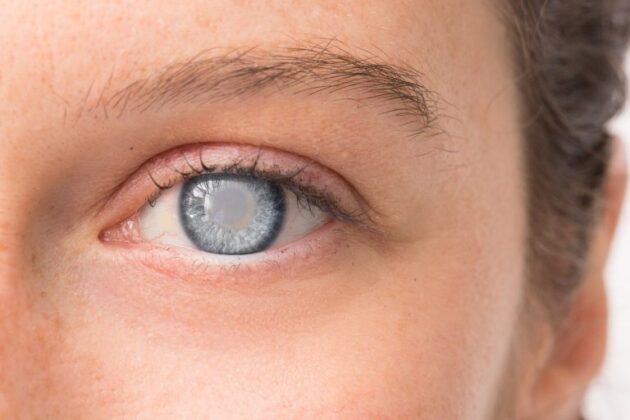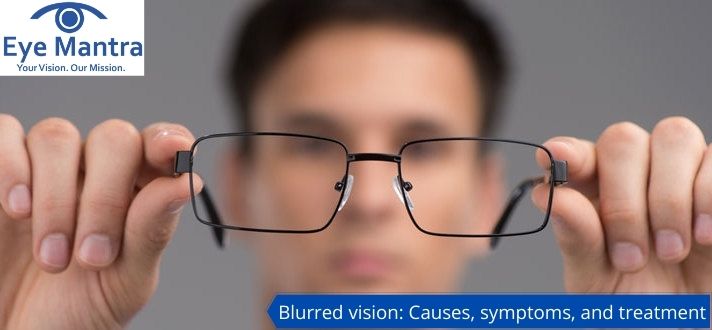Contents
Blurred Vision: Causes, Symptoms, And Treatment
Blurred vision refers to a lack of sharpness in vision or the images you are seeing. It can also be described as the inability to see the objects in fine detail. Blurred vision may result from abnormalities such as myopia, nearsightedness, farsightedness, presbyopia, or astigmatism. Such causes can be improved by using corrective lenses (or eyeglasses). However, sometimes it may signal the presence of eye disease.
Blurred vision may be experienced in one or both eyes. This would depend on the cause. Blurry vision can also be a symptom of various other health conditions that may not be directly related to the eye, such as migraine or stroke. Some medications may also lead to blurring your vision temporarily, as a side effect. Sometimes, it happens along with other symptoms, depending upon its cause. It may be accompanied by headache, sensitivity to light, redness, and irritation of the eyes. Blurred vision can also be known as clouded or dim vision.
Causes of Blurred Vision
A sharp and clear vision helps you navigate your world. Whether you need to read the road signs or if you are watching a movie in a theatre. Cloudy vision can make everything appear to be draped by a haze, and lead to a lack of focus.
It can affect your entire line of sight or just parts of your vision. This could be your peripheral vision, or how one particular side is visible to you. It may even be a blurred vision in only one eye. The blurred view may be caused by one or more of the below listed possible reasons:
Strain
You may have been focusing on a task for a long time or staring at the phone’s screen when you forget blinking at regular intervals. Blinking spreads tears across the surface of your eyes and keeps them lubricated, clean, and refreshed. We tend to blink less often when we are concentrating on something. You need to remind yourself to blink more often, take breaks, remember the 20-20-20 rule – every 20 minutes, where you need to look at an object kept 20 feet away for 20 seconds, or look around to prevent vision strain.
Inflammation
Eye tissues may get inflamed due to exposure to a harmful substance. The herpes virus from a cold sore could move to your eye. There are certain lifestyle practices that can lead to infections such as sleeping while wearing the contact lenses, not cleaning your glasses properly, or not changing them regularly. If a contact lens is worn for longer durations, protein may build up from the tear film and cause cloudy vision. Immune system diseases that affect other parts of your body including psoriasis, rheumatoid arthritis, and more can also cause inflammation in your eye.
Cataract

On crossing the age of 40, you’ll notice it’s harder to focus on close tasks such as reading. The clear lens inside your eye doesn’t remain as flexible as it was at a young age. It’s a normal part of getting old. You should get your eyes examined at eye hospital Delhi. And get yourself prescribed reading glasses, contacts, or surgery, as required.
During cataracts, the clear lens in front of the eyes gets cloudy. Though it is more common amongst the elders. However, younger people are also likely to develop the condition. It gets harder to see at night and you will become more sensitive to glare.
Pregnancy
Preeclampsia occurs when blood vessels in your placenta are too narrow and do not work correctly. This condition is associated with headaches, shortness of breath, and blurry vision.
You must consult your doctor right away. Without proper treatment, it can cause life-threatening difficulties.
Cornea Damage
Having dry eyes or a tiny particle inside your eyes increases the urge to rub your eyes. This practice can lead to damage to the cornea followed by an eye injury. However, it’s more likely to occur from a bit of dust or sand. Instead of rubbing, you should rather try washing your eyes with clean water. You can also blink rapidly a few times to hydrate them. But do not rub or touch your eyeball. If the condition persists, visit your eye doctor.
Weak Eyesight

When your eyeball has an oval shape instead of a round or if the cornea or lens doesn’t have the right curve, then the light cannot get focused on the right spot. This condition will enable you to see clearly only at certain distances (Nearsighted and Farsighted) or Astigmatism (distorted vision). Most often, such conditions can be corrected with eyeglasses, contact lenses, or minor surgery.
Lifestyle Diseases
Your eyes organs get severely affected due to the health conditions including diabetes, high blood pressure, poor nutrition, or other such diseases. People with diabetes are likely to get retinopathy and other eye diseases, When your blood sugar goes out of control, fluid may seep into the lens of your eye and it swells.
Migraine
Almost 1 out of 4 people with migraines get visual auras. It starts usually before the pain and remains for about an hour. However, if it occurs in only one eye, it may be serious. Check with your doctor immediately.
Damage To The Retina
The retina is a surface at the back of your eye where the light gets focused and the image is formed. If that surface gets swollen or torn, the image gets distorted or lost. Poor diet, smoking, previous eye injuries, eye diseases, and health issues such as high blood pressure, high cholesterol, and diabetes can increase the odds of problems like macular edema and a detached retina.
Symptoms of Blurred Vision
People who experience symptoms of blurred vision must visit an ophthalmologist. People with other diseases that sometimes cause retinal damage (for example, diabetes, high blood pressure, or sickle cell disease) should get their eyes checked as soon as possible. Preferably, within a few days. However, if vision has been worsening gradually for months or years but has not been severely impaired and there are no warning signs, waiting a week or longer is usually not harmful.
Eye examinations should be done at a good Eye Hospital in Delhi, by an ophthalmologist or optometrist. Ophthalmologists are better because they specialize in the evaluation and treatment (surgical and nonsurgical) of all types of eye disorders. Optometrists are practitioners who specialize in diagnosing and treating refractive errors (by prescribing glasses or contact lenses). However, sometimes the optometrists can also diagnose certain other eye problems and, further, refer the patient to an ophthalmologist for treatment. People should usually see an ophthalmologist if they have warning signs.
In people with blurred vision, below symptoms and characteristics are, mostly, a cause for concern.
- Sudden change in vision,
- Severely reduced vision, particularly in only one eye, even if the signs began gradually,
- Eye pain (with or without eye movement),
- Loss of vision in a specific area (called a visual field defect),
- Human immunodeficiency virus (HIV) infection or AIDS, or other condition affecting the immune system. For example, the use of chemotherapy or other immune-suppressing drugs.
Treatment of Blurred Vision
The treatment of blurry vision depends solely on the cause of the blurring. Refractive errors like myopia, hyperopia, and astigmatism can get corrected by using eyeglasses or contact lenses. With the contact lenses being a more comfortable option. But it is important to be careful about your contacts. Wear them correctly, keep them clean properly, and avoid leaving them inside the eyes for a longer period than advised.
If you are looking for something more permanent, you can opt for LASIK eye surgery as well. It is a quick, painless procedure. And gives you better vision with long-lasting results.
Blurry vision that is caused due to other health problems like diabetes can be addressed by taking the right medication for those issues.
Remember not to strain your eyes too much. Try to rest your eyes. Prevent fatigue and get sufficient sleep. Ensure that your eyes do not get dry. Use lubricating eye drops if required.
- Cataracts can be cured with Cataract Surgery. Or in some cases, as prescribed by your ophthalmologist, Phacoemulsification Surgery. In both these surgeries, the cloudy lens is replaced with clear and artificial ones.
- Diabetic Retinopathy can be treated with surgeries like Vitrectomy, Laser Coagulation, and Laser Surgery.
- Blurry Vision during Pregnancy is a temporary condition. Therefore, generally, only eyeglasses are prescribed. The normal vision should return within 6 weeks of delivery.
- Dry Eye Syndrome treatment includes artificial eye drops and ointments. Some punctual plugs may be used to conserve tears as well.
- Blurred vision associated with Glaucoma can be treated with the help of Laser Surgery.
- Eye Diseases such as Myopia, Hyperopia, Presbyopia, and Astigmatism can be corrected with eyeglasses, contact lenses, and Lasik Eye Surgery. For Presbyopia, implantation of Corneal inlay through Surgery may also be prescribed.
Get your eyes regularly checked by an eye specialist. She could diagnose early signs of eye diseases and treat them at the early stages themselves. She will be able to judge better the appropriateness or risks of a procedure for you.
Check Eyemantra, our website, for our other specializations. Some of them include Cataract Surgery, Specs Removal, Retina Surgery, and much more.
Call now at 9711115191 to book an appointment.
You may also email us at [email protected].
You may also check:
Do’s and Dont’s for protecting your eyes while playing Holi



